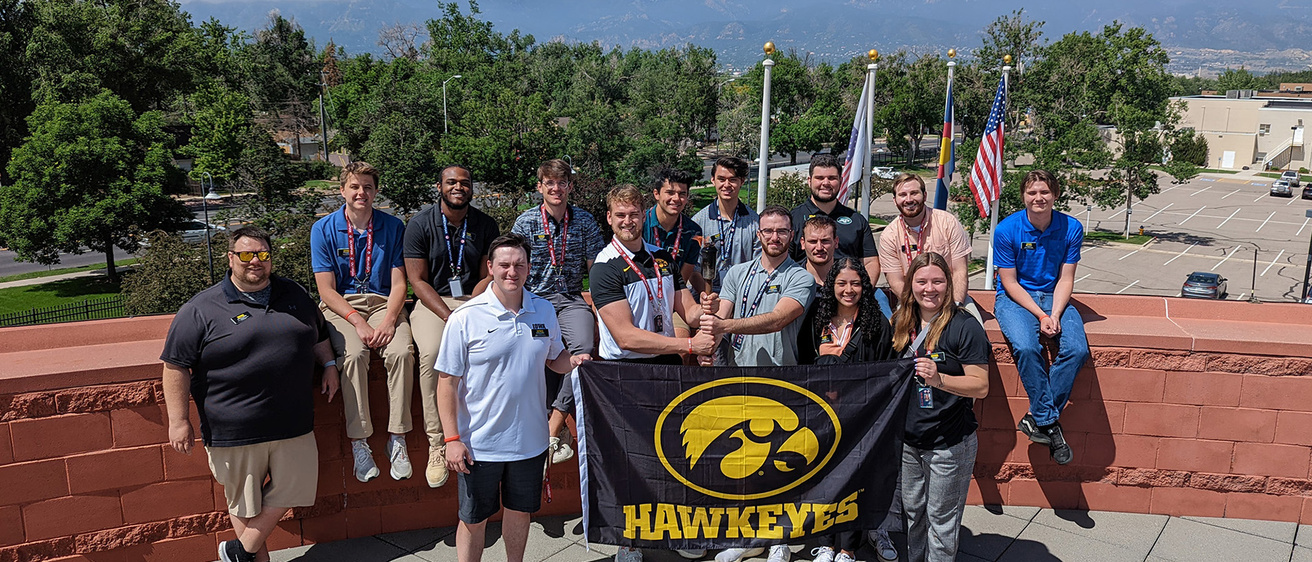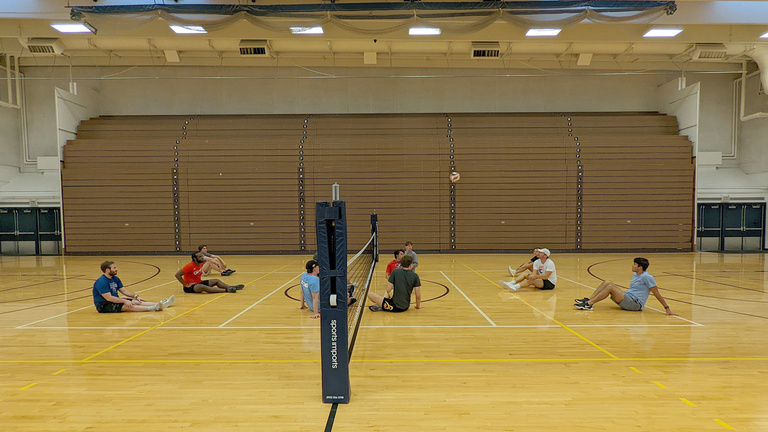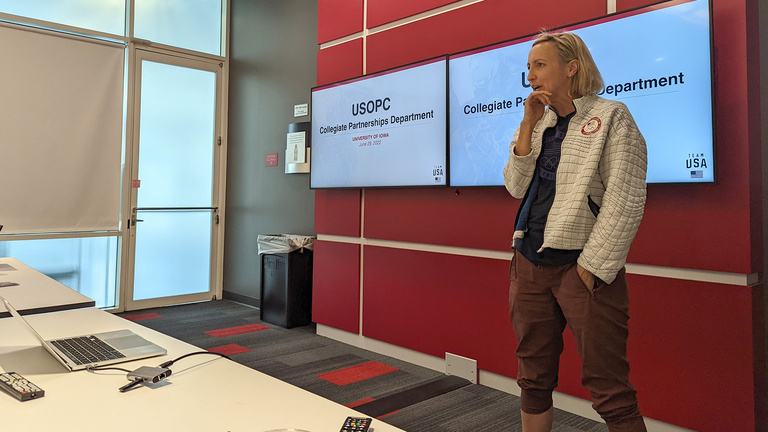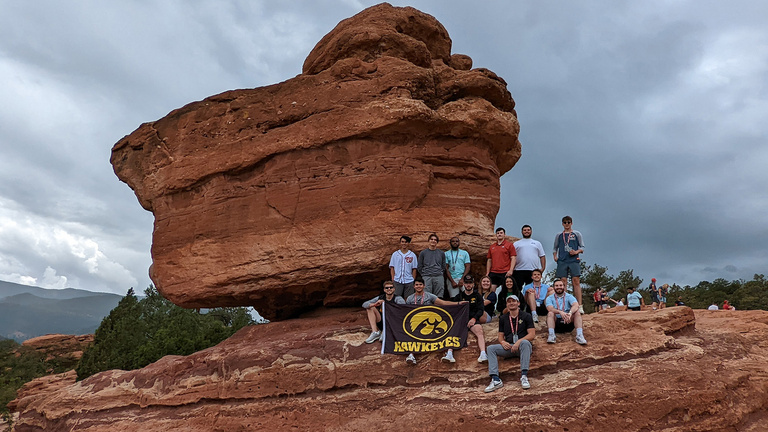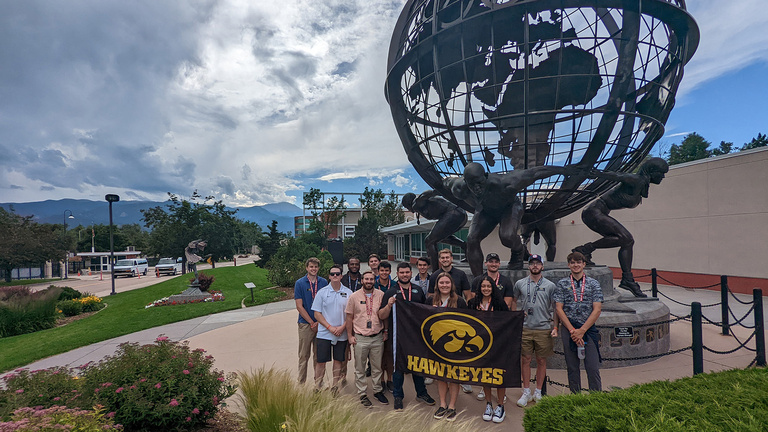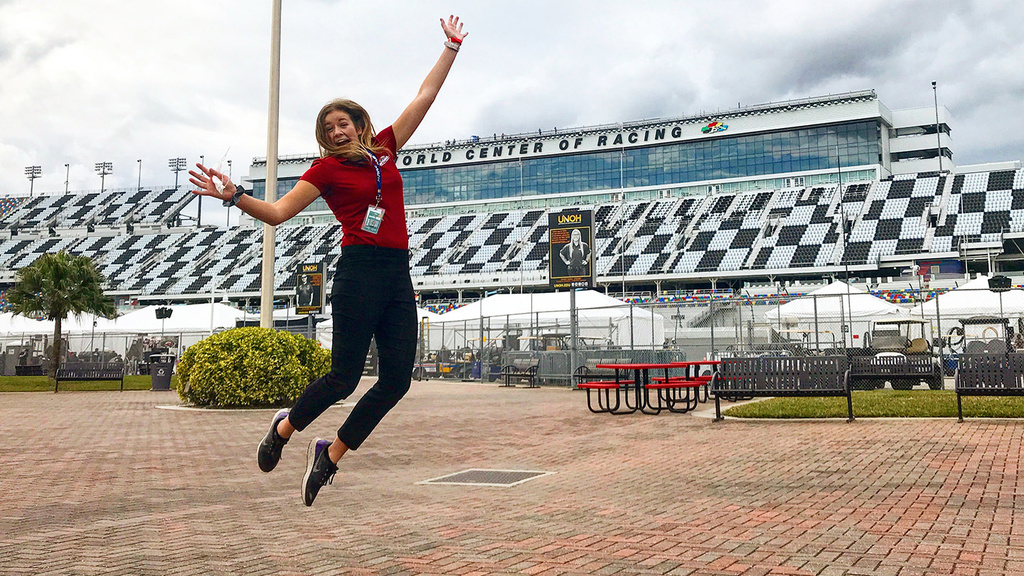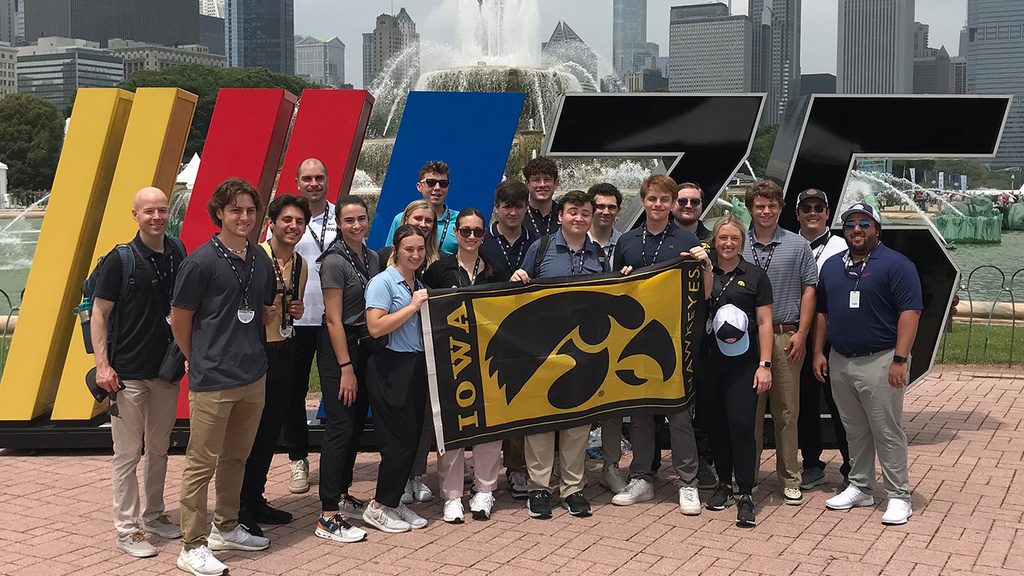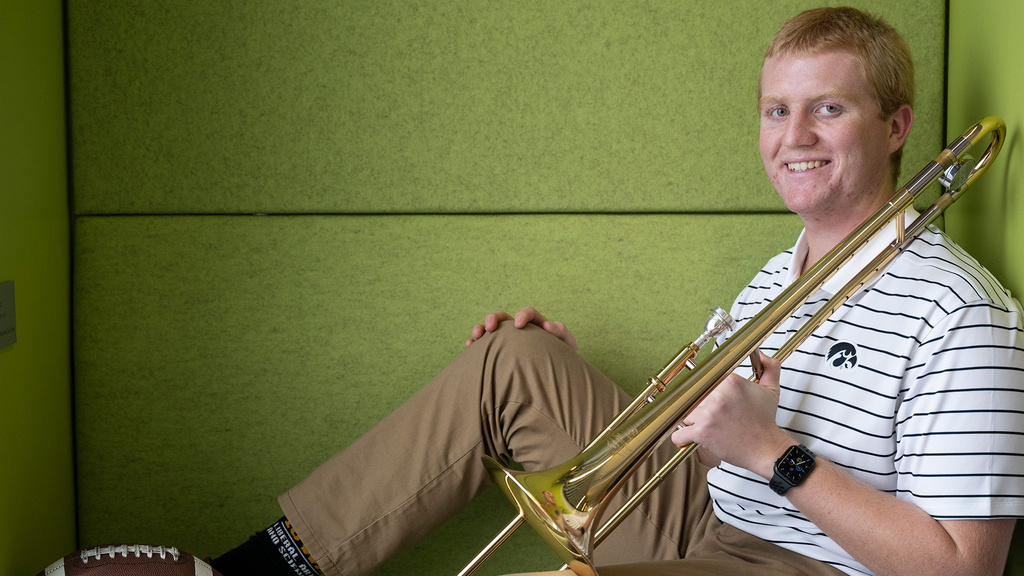University of Iowa sport and recreation management students spent a week learning about many aspects of a career with the Olympics — and lived like an Olympian in the process.
Story: Emily Nelson
Photography: courtesy of Jeremy Parrish
Published: July 20, 2022
Gold is the color of choice for Team USA. But for a week this summer at the U.S. Olympic and Paralympic Training Center in Colorado Springs, Colorado, black and gold was the dominant color combination.
Fourteen University of Iowa students from the sport and recreation management program traveled to Colorado for a unique practicum that allowed them to learn from and network with a broad range of people involved with the Olympic Movement, the organizations and actions carried out under the authority of the International Olympic Committee.
They also lived alongside the country’s elite athletes and coaches at the training center for a week.
“It was cool to get a sort of ‘week in the life of an athlete,’” says Jill Holub, a fourth-year sport and recreation management student from Williamsburg, Iowa. “We lived in the same dorms as them and would see them at breakfast, lunch, dinner, see them going to practice and coming back from practice. It was just a great experience.”
Jeremy Parrish, lecturer in the sport and recreation management program, created the field experience — which was planned to start in 2020 but was canceled due to COVID-19 and was conducted virtually in 2021 — to take a deeper look at this unique part of the sports industry.
“This practicum provides a different angle from a business perspective than other traditional sports,” Parrish says. “The Olympic Movement is its own unique corner in the industry; although it shares some qualities of intercollegiate athletics and nonprofits, our textbooks don’t always do a good job of making it clear that the Olympics are a viable place to have a career.”
Before heading to Colorado, the Team USA practicum experience began with intensive teaching about the Olympic Movement, which armed students with the baseline Olympic knowledge they needed. They then applied those lessons to a project with the Iowa City Area Sports Commission and USA Team Handball, in which the students developed a potential multiday tournament that could have positive local impact while helping to grow interest in a developing sport. The group then packed their bags and headed west to Colorado Springs.
The group had a full itinerary while in Olympic City USA, getting exclusive tours of the Olympic and Paralympic Training Center facilities; trying Paralympic sports such as wheelchair basketball, sitting volleyball, and goalball; and taking in area attractions, including Pikes Peak, Garden of the Gods, the Air Force Academy, and a Rocky Mountain Vibes minor league baseball game. The students broke into groups to work on projects — such as cultivating more youth engagement with the Olympic Movement, recommending pricing for the U.S. Olympic & Paralympic Museum, and quantifying the cost of an Olympic medal — that they then presented at the end of the week.
Financial aid for experiential learning
Several students who participated in the summer 2022 Team USA guided field experience course received scholarships through the John E. Evans Experiential Learning Award. The scholarships have made it possible for dozens of students to participate in life-changing experiences at no or very low cost.
“Scholarships like these can make a big difference for someone who may not be able to participate otherwise,” says Jeremy Parrish, lecturer in the sport and recreation management program. “We know how important experiential learning is to the sport industry, and this fund is built to help students who have financial need get those opportunities.”
Learn more about this scholarship and others within the sport and recreation management program here.
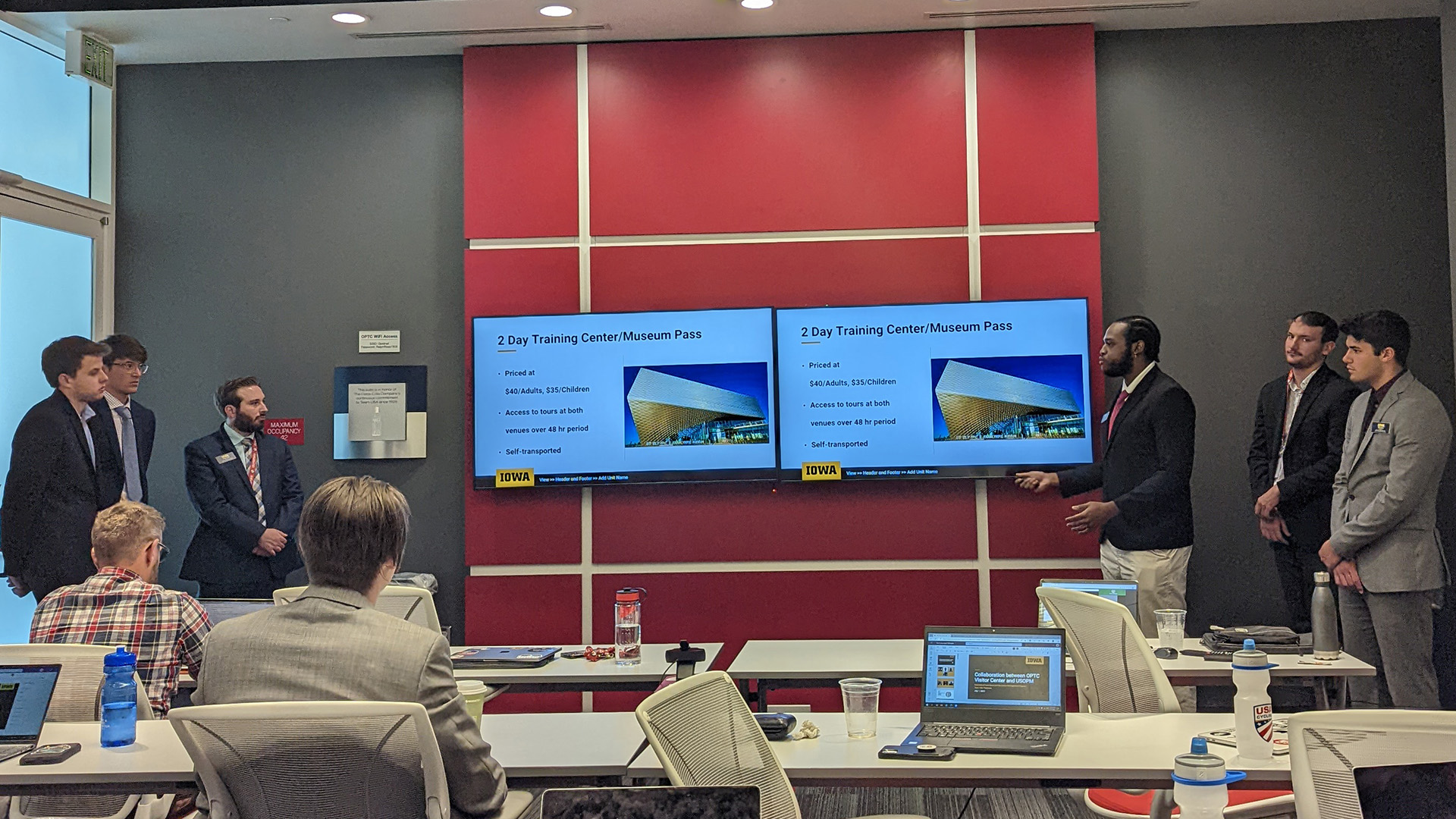
The Iowa students broke into groups to work on projects — such as recommending pricing for the U.S. Olympic & Paralympic Museum — and gave presentations at the end of the week.
They also met and spoke with CEOs, vice presidents, and senior directors from several national governing bodies of sports, the United States Olympic and Paralympic Committee (USOPC), and the United States Anti-Doping Agency.
“The speakers ranged all the way from working with specific sports like wrestling and bobsled, all the way up to more administrative work like the collegiate partnerships division of the USOPC,” says Cameron Bottum, a fourth-year sport and recreation management student from Rockford, Illinois. “It was cool to get a narrower view as well as that kind of 10,000-foot view of the Olympics from all those people.”
Along with learning from the speakers, the networking the students were able to engage in was invaluable, Parrish says.
“They were speaking in a lot of cases to the people at the top,” Parrish says. “And the connection they make is not only with that one person, but their network beyond them. It’s hard to quantify how powerful that can be, especially for a young person looking to go into the industry.”
The students agree.
“I’ve heard the chatter since I first got to Iowa: It’s all about who you know, and Hawks help Hawks,” Bottum says. “It’s just such a small world, the world of sport, so networking with professionals is absolutely crucial. To know I’ve made contact with 20 people at the Olympics — people who could provide a lead on a job, or point me toward someone else who might have an open position — that’s really exciting. The more people we meet definitely lessens that load on graduates.”
A few of the guest speakers also went an extra mile for the Iowa students. Charlie Huebner, vice president of Paralympic development for the U.S. Olympic & Paralympic Foundation, offered to review the students’ résumés and make suggestions — an offer some students accepted before they even left Colorado.
“It was just a really great experience with lots of great people who were all welcoming and friendly and really wanted us to learn,” Holub says. “They really took time out of their day to make sure that we got the most out of it.”
The slate of guest speakers included two University of Iowa alumnae: Morgan Rabine Benham, manager of corporate partnerships for USA Wrestling, and Sarah Wilhelmi, senior director of collegiate partnerships for USOPC.
Wilhelmi, who grew up in Remsen, Iowa, and graduated from Iowa with a BBA in finance in 2003 and an MA in health and sport studies (athletics administration) in 2005, says her fellow Hawks were well-prepared.
“I was just so impressed by the questions they had,” Wilhelmi says. “From how name, image, and likeness is impacting Team USA and the college landscape to how we created our Collegiate Advisory Council. It was apparent that they did their homework, because they knew that (former Iowa Director of Athletics) Bob Bowlsby, who serves on the council, is retiring, so we talked about the mechanics of building a strong transition plan.”
Turn a love of sports into a career
Students with a degree in sport and recreation management can find a variety of career opportunities including community recreation, intercollegiate athletic departments, high school programs, the commercial fitness business sector, and minor and major league sports teams.
“These experiences are life-changing. They can set your trajectory. I had the privilege during an internship to work with the Paralympics. Now, I’m helping launch the Para-College Inclusion Project to grow adaptive sport opportunities in universities and colleges, and those were seeds that were planted during my time at Iowa.”
Holub says talking to former Hawkeyes is especially significant.
“It’s comforting knowing that someone who went to the same school as me and has a similar background now works for the Olympics,” Holub says. “It helps to hear how they got to their position and know that that’s a possible route I could take.”
Several students say that while a career working with the Olympic Movement was not on their radar before the trip to Colorado Springs, it is now.
“There are more jobs than you think in the sports industry, and I want to see what they are and what people do to see if it’s something I would like,” Holub says.
Ben Garza, a fourth-year sport and recreation management student from Waukee, Iowa, says he hopes to become a producer for live sports broadcasts after graduation.
“I wasn’t sure which sports or which company I’d like to work for, and I had never genuinely considered the Olympics as a possible career because I knew nothing about it or the structure of it,” Garza says. “But now I can begin to consider it as a viable option.”
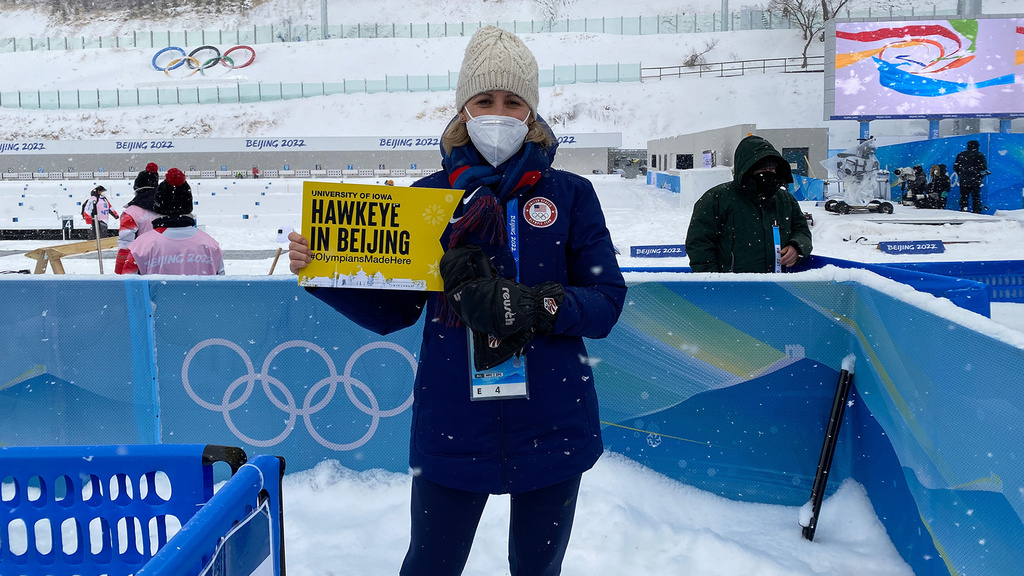
Olympic-size dream began at Iowa
Former Hawkeye runner Sarah (Arens) Wilhelmi now works to build bridges between college athletes and Team USA Olympians and Paralympians.
For many of the students who went to Colorado, this wasn’t their first Iowa-led practicum. Bottum, Garza, and Holub all have participated in other field experiences, including Fans First, Special Olympics Iowa, San Diego Sports Consulting Practicum, and trips to facilities and organizations in Chicago and Kansas City.
“I know that Iowa will set up the practicums in a way that will be the most helpful for Iowa students,” Garza says. “If I go out and do an independent field experience, it might not check all the boxes that I would need, but that’s not the case with Iowa-led practicums.”
Wilhelmi knows firsthand how important hands-on experience can be to a student’s life.
“These experiences are life-changing. They can set your trajectory,” Wilhelmi says. “I had the privilege during an internship to work with the Paralympics. Now, I’m helping launch the Para-College Inclusion Project to grow adaptive sport opportunities in universities and colleges, and those were seeds that were planted during my time at Iowa.”
Along with a potential boost to a future career, practicums such as the Team USA Experience offer something else for students, Bottum says.
“Very few people can say they’ve stayed at the Olympic Training Center, especially not being an athlete,” Bottum says. “We stayed in the dorms; we got to walk around their campus; we got to swim in the same pool that Michael Phelps swam in. These are lifelong memories that I wouldn’t have had without the sport and recreation management program.”
